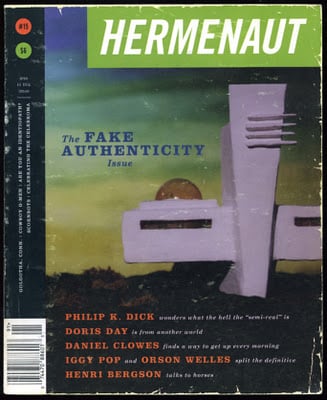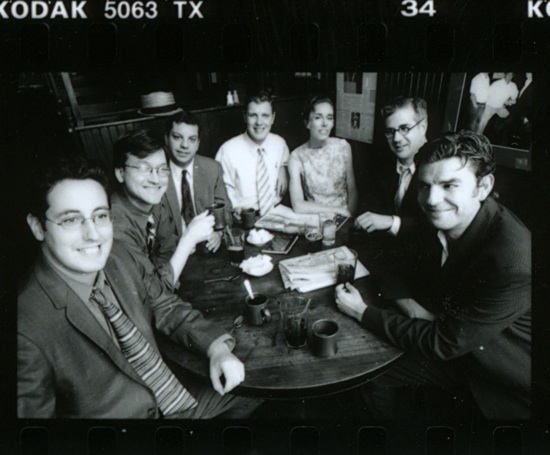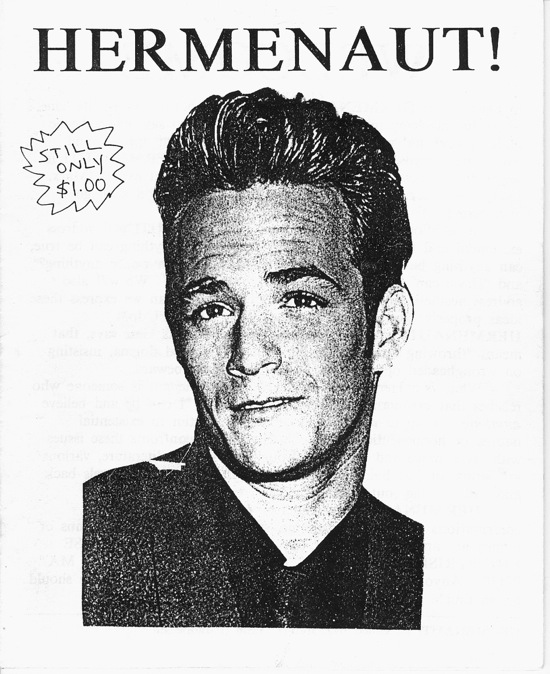Meet the Hermenauts
By:
November 21, 2011

In October 1999, Lingua Franca profiled Hermenaut, an independent zine/journal which I’d founded. This profile is snarky, and there’s a “Gotcha!” moment at the end, but it’s a halfway decent snapshot of a project that ended just two years later. I was reminded of it today because my friend Kio Stark’s project Don’t Go Back to School is very much in the same vein as Hermenaut — the ethos of which, as I told Lingua Franca (rather to the interviewer’s amusement), was “I can read and think for myself, without a syllabus.” For what it’s worth, here is that profile.
Click on the link above and support Kio’s project!
When Joshua Glenn entered the program in sociology at Boston University in 1991, many things about academic life bothered him — and the near-inescapable term “hermeneutics” embodied them all. “I got sick of hearing the word,” he says. “People were using a four-syllable word for ‘the search for meaning’ in preference to actually searching for meaning.” So in 1992 — needing, he says, “a steam valve to release the pressure from graduate school” — Glenn put together the first xeroxed-and-stapled issue of Hermenaut. Borrowing a suffix from the word “astronaut” — thereby revealing, perhaps, a subconscious identification with John Glenn — he coined a neologism meaning (very roughly) “a traveler in search of signification.” At the time, Glenn concedes, he just thought it sounded cool.
With its fifteenth issue now on the stands, Hermenaut has come a long way from its beginnings as a twenty-page pamphlet run off surreptitiously by a friend at Kinko’s. An attractive book-format journal, this “Digest of Heady Philosophy” has a steady circulation of five thousand. (Don’t bother ordering any of the first ten issues; they’ve sold out.) The staff — as irregular in size as the magazine is in publication schedule — now works in a building owned by the Sam Adams Brewery in Allston [actually Jamaica Plain], Massachusetts. Yet Hermenaut remains very much in the spirit of its debut issue, in which an essay on the German poet and philosopher Novalis appeared alongside Glenn’s blistering critique of Sassy magazine, “Smells Like Teen Reification.”

Neither postpunk ‘zine nor scholarly journal, Hermenaut is, in fact, a bit of both. It reads like a cultural studies seminar being crashed by well-read bohemians who are resolutely unimpressed by mere academic protocol. Call it the slacker Salmagundi. A typical issue features a “Hermenaut of the Month,” a culture hero selected by Glenn. These long essays — on Oscar Wilde, Charles Baudelaire, and Simone Weil, among others — are scholarly but engagingly written. They show that Glenn has read his Nietzsche with considerably more attention than, say, your typical brooding sophomore who quotes the aphorisms to justify being a jerk.
When Hermenaut writers annoy, at least they do it with style. There’s a regular column by somebody named “Slotcar Hatebath” who rants about, for instance, the suburban hip-hop enthusiasts who call themselves “wiggers.” Making fun of their “extravagantly protective hand gestures and tortured pseudo-ebonics,” Hatebath suggests young Caucasian-Americans try exploiting other ethnic Others. “For those of you that enjoy chillin’ in cribs made out of ice,” he writes, “consider becoming a Weskimo.” A few pages later, another article points out that Søren Kierkegaard (“everybody’s favorite unread philosopher”) was, at heart, a perpetual grad student “who — like so many of his kind today — expended much of his intellectual energy on justifying his inaction.” Given this tone of graceful aggression, it is no surprise that one “Hermenaut of the Month” was Bruce Lee — a onetime philosophy major at the University of Washington, Seattle, for whom a fighting style was a weltanschauung (and vice versa).
What really defines the magazine, though, are its pop-culture essays — several per issue — which are at once loving and recondite. A given issue might include a critical paper on the Melrose Place novels, or a metaphysical consideration of the trajectory of Evel Knievel’s career. One memorable essay examined 1970s single-woman situation comedies, invoking the crucial difference between Louis Althusser’s theory of “interpellation” and Michel de Certeau’s understanding of “resistance.” Who knew this would prove so invaluable in grasping That Girl and The Mary Tyler Moore Show?
This high-speed shifting of brows — from low to high and back again — is typical of hipster-doofus literati, nowadays. A quick glance would suggest that Hermenaut is devoted to little else. (And after all, as honorary Hermenaut Oscar Wilde said, it is only shallow people who do not judge by appearances.) But Glenn insists that his magazine is locked in mortal struggle with what he calls “a neo-Foucauldian conspiracy” of pseudo-intellectuals who have carried a smattering of theory with them into the entertainment industry. (Note to the John Birch Society: this is a joke.) Hermenaut’s regular Philosophywatch column chronicles the doings of journalists who “spread meaning onto their prose like cupcake frosting” by “drag[ging] a philosopher’s name into everything they type.” The evidence cited is disturbing. For example, an Us magazine article on Pamela Anderson Lee invokes Plato’s early dialogues, while The New York Observer finds that Alanis Morissette’s use of pronouns must be glossed with Martin Buber’s I and Thou.

Glenn’s life since grad school has been a lesson in how a free-floating intellectual entrepreneur can thrive outside academia. He taught high school and tended bar for a while, then became an editor at the Utne Reader. Later, he worked for the online magazine of the Internet company Tripod — and spent his evenings immersed in Kierkegaard’s dissertation, On the Concept of Irony. When Lycos bought out Tripod, the company went public, and Glenn cashed in his shares. Since June 1998, he’s been able to work full-time on Hermenaut. And the investment of time and funds shows in the magazine’s recent issues, in which the graphics are nearly as smart as the prose.
Today, Glenn says that he gets about twenty or thirty manuscripts a week from people performing shotgun weddings of kitsch and concept. “It’s awful,” he says. “It’s mostly about deconstructing the Smurfs, or how Dragnet is existentialist. Just complete junk. And the worst stuff is by professors. We have a policy that we don’t publish academics. There should be people outside the university thinking about the culture and their lives. The thing is, they’ve got to be thinking, not just making these glib comments.”
In what direction, then, does Hermenaut’s own quest move? Glenn has championed a series of thinkers and artists who keep a distance from mass culture without being merely sarcastic about it. A snarky Generation X-ish “celebration” of the 1970s pop band the Carpenters is just cheap — and (worse) unphilosophical. But actually being moved by the promesse de bonheur in Karen Carpenter’s voice — while remaining acutely conscious that her anorexic will to power was meaningless and deadly — is an honorable complication of sensibility.
This line of reflection continues in the magazine’s latest number, dubbed “The Fake Authenticity Issue.” The Hermenaut of the Month is Philip K. Dick, whose gnostic science fiction novels map a vertiginous universe where the “reality” behind every “illusion” proves to be another level of deception. Contributors explore the cultural regime of “fake authenticity” — a term that subsumes pre-frayed Dockers, the Olive Garden’s cheesy simulacrum of Italian dining, and the plague of antique shows on PBS. But the devotion of anticorporate hipsters to “authentic” rockabilly or Delta blues is no less phony. (You end up like Heidegger, dressed in rustic drag, annoying the peasants.)
As they contemplate their role as aesthetes in a mass society, the Hermenauts will accept the occasional dribble of ad revenue from university presses. In the most recent issue, one page is split between two advertisements: one for the new edition of Derrida’s Of Grammatology, the other for records by the punk band Fugazi. But Glenn is very clear about Hermenaut’s relation to the university. “One of our secret fantasies,” he confesses, “is that students and professors will discover Hermenaut, then drop out. They would see it and think: I can read and think for myself, without a syllabus. I can live the life of the mind while working a crappy job.” The dream of authenticity doesn’t die easily.
